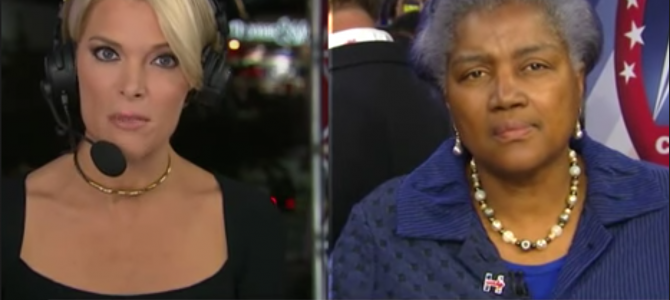As a second leaked email showed Donna Brazile sliding debate questions to the Hillary Clinton campaign, on Monday CNN announced it had cut ties with the chairwoman of the Democratic National Committee October 14. That cut had taken place a few days after the first leaked email revealed Brazile had given Clinton intel on questions that would be asked at a town hall.
Brazile’s contract with CNN had been suspended since July when yet another set of leaked emails had implicated the previous Democratic National Committeewoman in an election-rigging scheme to ensure Hillary Clinton won the Democratic primary. Brazile had continued as a contributor, however.
Brazile, who had to resign her post in the 1992 Dukakis campaign when she spread infidelity rumors about former President George H.W. Bush, has denied any wrongdoing and said questions about why she shared information with the campaign were about Russia, thieves, and persecuting her as a Christian.
CNN’s senior media correspondent Brian Stelter wrote in his nightly newsletter that while it is understood that Roland Martin leaked the first question to Brazile, she got the second question perhaps by speaking with the woman who would ask it at the town hall: “My impression is that Brazile met the resident during a day of community service in Flint that CNN held one day before the debate.” The Washington Post reported the description of the woman Brazile gave in her email to John Podesta and Jennifer Palmieri matches Flint resident Lee-Anne Walters. The Daily Caller’s Chuck Ross called Walters, who said she was “99 percent sure” that she did not talk to Brazile.
CNN issued a statement where it denied wrongdoing:
In a statement, CNN said it was ‘completely uncomfortable with what we have learned about her interactions with the Clinton campaign while she was a CNN contributor.’
CNN said it ‘never gave Brazile access to any questions, prep material, attendee list, background information or meetings in advance of a town hall or debate.’
Former CNN contributor Ari Fleischer said:
I was a CNN contributor in 2012 & was never privy to any questions 2the candidates. Donna Brazile owes an explanation of how she got the Qs.
— Ari Fleischer (@AriFleischer) October 31, 2016
Roland Martin doesn’t work for CNN, but his media outlet was a partner for a Democratic town hall he co-hosted. When sharing Martin’s tip, Brazile made it seem like a common occurrence, the subject of the email being, “From time to time I get the questions in advance.”
In the subsequent case, where Brazile gave the information about the Flint, Michigan, town hall question, she also said she would send a few more questions.
Stelter quoted the Huffington Post’s Sam Stein: “What Donna Brazile did at CNN was awful. And damages the reputation of the media at large.”
This is undoubtedly true. One of the problems is CNN’s own insufficient response to the Brazile news. There is no evidence that CNN handed over sensitive information to Brazile, much less that they did so intentionally. At the same time, a statement simply saying they didn’t do that is a statement that doesn’t come close to sufficiently answering the questions of how Brazile got the questions.
As a news organization, CNN should not stop digging until it gets answers. Obviously the questions got from CNN to the Clinton campaign through Brazile. Even if you accept the rather outlandish scenario that Brazile happened to chat up a woman who happened to ask a question and happened to know the right question topic that would be asked, that doesn’t explain Brazile’s repeated claims that she regularly gets questions in advance.
CNN might be content to let this go, but it’s doubtful that viewers who are already skeptical of CNN and other media outlets’ ability to cover news well will be so easily comforted.
All media outlets that encounter Brazile should demand answers from Brazile and refuse to accept claims of Christian persecution or appeals to Martin Luther King, Jr., as substitutes for real answers.









